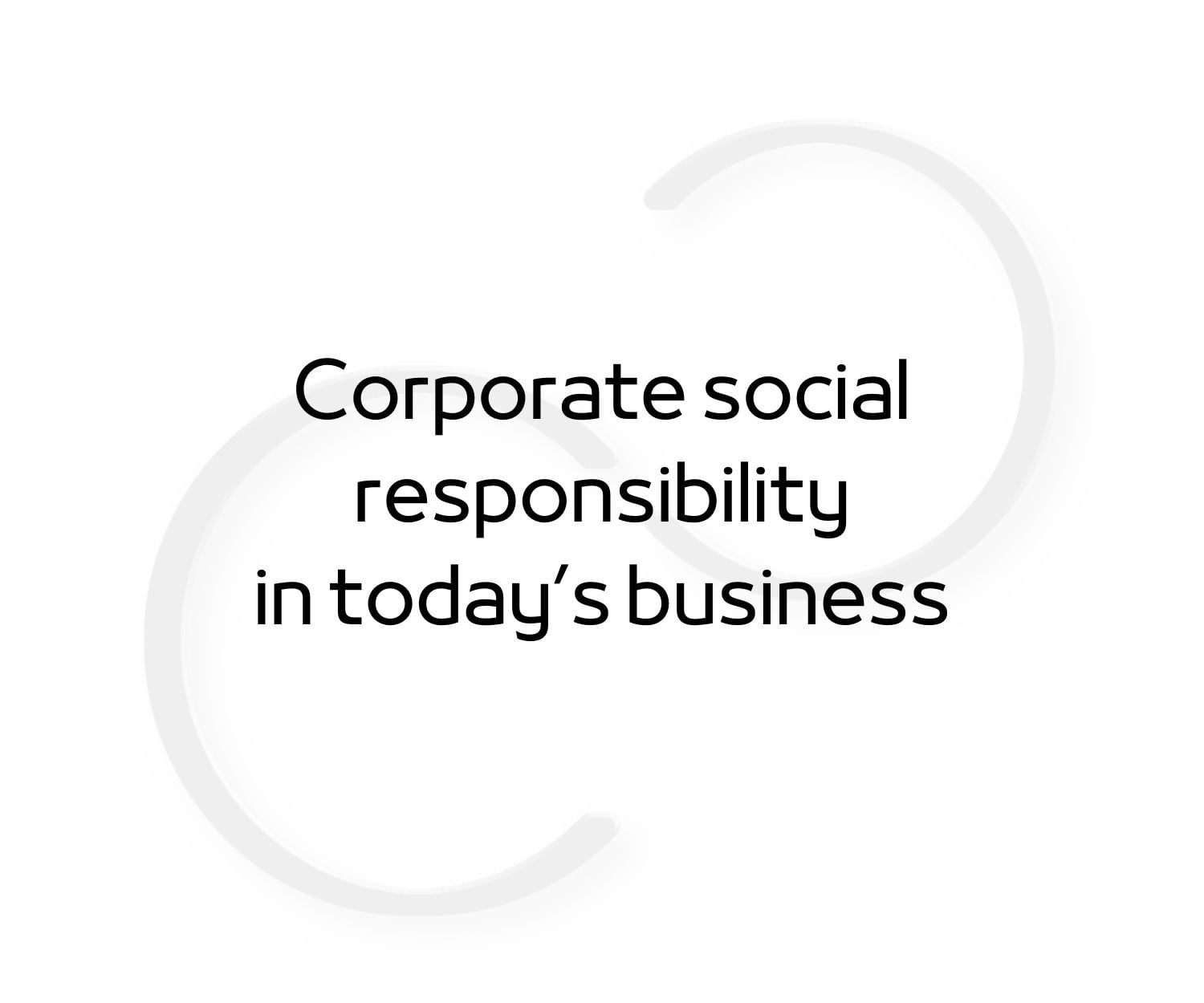I think that the concept of corporate social responsibility (CSR) stands as a beacon of ethical engagement. Imagine a world where companies aren’t just profit-hungry villains but eco-warriors battling climate change and social injustice. Sounds like a comic book. CSR is something businesses are stepping up to, wanting to be the heroes we desperately need. But forget the days of greenwashing and empty gestures. Let’s not treat it as slapping a bandaid on a gaping wound.
The price of greatness is responsibility.
Winston Churchill

What is corporate social responsibility?
Let’s define corporate social responsibility and see what CSR refers to. We can call it the company’s efforts to operate in a way that is beneficial to society and the environment, while also being profitable. It’s essentially a self-regulating business model that encourages businesses to be responsible towards their stakeholders, which include:
- Employees – ensuring fair wages, safe working conditions, and opportunities for professional development.
- Customers – providing high-quality products and services, ethical marketing practices, and transparent communication.
- Communities – investing in local initiatives, supporting charitable causes, and minimizing negative environmental impact.
- Environment – reducing waste, conserving resources, and using sustainable practices.
- Investors – delivering financial returns while upholding ethical standards and managing risks responsibly.
Key aspects of corporate social responsibility
Let’s explore some key aspects of corporate social responsibility:
- Sustainability: using resources efficiently and minimizing negative environmental impact. This can include reducing greenhouse gas emissions, conserving water and energy, and using recycled materials.
- Social responsibility: treating employees fairly, supporting the community, and promoting ethical business practices. This can include providing fair wages and benefits, offering training and development opportunities, and supporting local charities.
- Governance: having strong ethical standards and transparent decision-making processes. This can include having a board of directors with diverse perspectives, being transparent about financial reporting, and having a code of conduct for employees.
Benefits of CSR
The benefits of implementing Corporate Social Responsibility initiatives extend beyond altruism. Businesses that embrace CSR strengthen their brand recognition and reputation and foster a culture of innovation and sustainability. Additionally:
- Consumers are increasingly looking to support companies that are committed to CSR. A strong CSR program can help a company build a positive reputation and attract new customers.
- Employees are more likely to be engaged and productive if they work for a company that is committed to CSR. This can lead to improved employee morale, reduced turnover, and higher productivity.
- CSR can help companies reduce costs by improving efficiency, reducing waste, and attracting and retaining top talent.
- By addressing social and environmental issues, companies can reduce their risk of regulatory fines, lawsuits, and reputational damage.
Let’s see what customers think about corporate social responsibility:
(Sources: Cone Communications, 2023/3BL Media, 2022)
Criticisms of CSR
Critics of corporate social responsibility often raise several key points:
- Greenwashing: Some companies engage in “greenwashing,” which is the practice of making false or misleading claims about their environmental commitment.
- Lack of transparency: Some companies are not transparent about their CSR activities, making it difficult to assess their impact.
- Focus on public relations: Some companies see CSR as a way to improve their public image, rather than as a way to make a real difference in the world.
Principles of corporate social responsibility
The principles of corporate social responsibility serve as a guiding framework for companies to navigate their social and environmental responsibilities. While different frameworks and interpretations exist, some widely accepted core principles include:
- Accountability – companies should be transparent and accountable for their actions and their impact on stakeholders, including employees, customers, communities, and the environment. This involves publishing regular reports, conducting independent audits, and actively responding to concerns.
- Transparency – companies should openly communicate their CSR initiatives, goals, and progress with stakeholders. This includes disclosing relevant information about their environmental footprint, labor practices, and governance structures.
- Ethical behavior – companies should uphold ethical standards in all their operations, including fair competition, responsible marketing, and anti-corruption practices. This includes having clear codes of conduct for employees and conducting due diligence on suppliers and partners.
- Respect for stakeholder interests – companies should recognize and respect the rights and interests of all their stakeholders, not just shareholders. This involves actively engaging with stakeholders, understanding their concerns, and incorporating their feedback into decision-making processes.
- Respect for the rule of law – companies should comply with all applicable laws and regulations, even where they exceed minimum legal requirements. This includes respecting human rights, labor standards, and environmental regulations.
- Respect for international norms of behavior – companies should act by international norms and standards, such as the UN Global Compact and the OECD Guidelines for Multinational Enterprises. This demonstrates their commitment to responsible global citizenship.
- Respect for human rights – companies should respect and uphold human rights throughout their operations, including their supply chains. This involves avoiding complicity in human rights abuses and promoting ethical labor practices.
Additional considerations
These principles are not absolutes but rather a starting point for companies to adapt and implement based on their specific context, industry, and size. Monitoring, evaluating, and improving CSR practices is crucial to ensure their effectiveness and impact.

The difference between CSR and sustainability
There is a difference between CSR and sustainability, even though they are often used interchangeably. Here’s a breakdown:
| Aspect | CSR (Corporate Social Responsibility) | Sustainability |
| Focus | Voluntary actions companies take to address social and environmental concerns, going beyond what’s legally required. | The ability to meet present needs without compromising the ability of future generations to meet their own needs. |
| Scope | Primarily on managing impacts, focusing on how a company operates (e.g., reducing emissions, fair wages). | Broader, encompasses the entire system within which a company operates, including social, economic, and environmental aspects. |
| Approach | Can be reactive, addressing specific issues raised by stakeholders. | Proactive and integrated, aiming for long-term solutions and systemic change. |
| Measurement | Primarily qualitative, measuring efforts and initiatives undertaken. | Both qualitative and quantitative, measuring impacts and progress towards broader goals. |
Think of CSR as “doing good deeds,” like volunteering at a local soup kitchen. Sustainability, on the other hand, is more like “building a sustainable food system,” considering the entire farm-to-table process and its long-term impact.
Key differences
- Scope: CSR is narrower, and focused on a company’s immediate operations and impacts. Sustainability encompasses the entire system and considers far-reaching consequences.
- Approach: CSR can be reactive, responding to specific issues. Sustainability is proactive, aiming for long-term solutions and systemic change.
- Measurement: CSR is often measured qualitatively, focusing on efforts and initiatives. Sustainability uses both qualitative and quantitative methods, assessing impacts and progress toward broader goals.
Examples:
- CSR: A company investing in renewable energy to reduce its emissions.
- Sustainability: A company collaborating with farmers to develop sustainable agricultural practices and address the broader issue of climate change.
Examples of CSR
Here are examples of corporate social responsibility from real-world companies that have incorporated it into their business models:
- Patagonia: Incorporates environmental activism, from using recycled materials to advocating for land conservation, proving sustainability can be stylish and profitable.
- Tesla: Combats climate change while disrupting the auto industry by pioneering electric vehicles, demonstrating that innovation drives both environmental and financial success.
- Ørsted: Transforming from a coal giant to a global leader in renewable energy, Ørsted shows the power of bold sustainability commitments, proving transition is possible and profitable.
- Starbucks: Through community grants and programs supporting coffee farmers and local initiatives, Starbucks invests in the communities they serve, demonstrating that commitment to community well-being can strengthen brand engagement.
- IKEA: The furniture giant focuses on sustainable forestry practices and invests in affordable housing solutions, improving lives and the environment, showing that responsible sourcing and community investment can be mutually beneficial.
Corporate social responsibility trends
In recent years, we’ve witnessed a surge in CSR trends, reflecting a growing awareness of the importance of corporate responsibility.
1. Sustainability
- Climate Action: Companies are under increasing pressure to address climate change through ambitious emission reduction targets, renewable energy investments, and circular economy initiatives.
- Biodiversity & Ecosystem Services: Protecting nature is no longer just an add-on; companies are recognizing the value of healthy ecosystems for their business and investing in restoration projects, sustainable agriculture, and responsible sourcing.
- ESG Integration: Environmental, Social, and Governance (ESG) factors are no longer just for investors; companies are integrating ESG considerations into their core decision-making, from product development to supply chain management.
2. Beyond environmentalism
- Social Justice and Equity: The fight for social justice is gaining momentum, and companies are expected to take a stand on issues like racial equity, LGBTQ+ rights, and fair labor practices.
- Community Engagement: Building strong relationships with local communities is becoming a key CSR strategy, with companies partnering with community organizations, investing in local development, and empowering residents to create shared value.
- Human Rights at the Forefront: Respecting human rights throughout the supply chain is becoming a non-negotiable expectation, with companies auditing their suppliers, ensuring fair working conditions, and advocating for broader human rights initiatives.
3. Transparency and accountability
- Stakeholder Engagement: Companies actively engage with stakeholders, including employees, customers, investors, and communities, to understand their concerns and expectations regarding CSR.
- Impact Measurement and Reporting: Measuring and communicating the social and environmental impact of CSR initiatives is crucial for building trust and demonstrating effectiveness, with companies using robust frameworks and clear metrics.
- Technology for Good: Technology is playing a key role in driving CSR innovation, with companies using blockchain to track sustainable practices, AI to identify social risks, and data analytics to measure impact.
4. The power of collaboration
- Industry Partnerships: Companies are increasingly collaborating with competitors, NGOs, and governments to address complex social and environmental challenges, through shared platforms, joint research projects, and collective advocacy efforts.
- Multi-Stakeholder Initiatives: Global initiatives like the Sustainable Development Goals (SDGs) are providing a framework for collective action on critical issues, with companies aligning their CSR strategies with these goals and collaborating with diverse stakeholders to achieve them.

Best practices and guidelines for corporate social responsibility
Here are some CSR best practices and guidelines for CSR:
General principles:
- CSR should integrate seamlessly with your company’s mission and goals.
- Prioritize the social and environmental impacts most relevant to your business and stakeholders.
- Communicate your CSR initiatives, progress, and challenges.
- Actively involve employees, customers, communities, and other stakeholders in your CSR efforts.
- Define clear objectives and track your progress towards them.
Specific practices:
- Reduce your carbon footprint, conserve resources, and use sustainable materials.
- Ensure fair labor practices, promote diversity and inclusion, and support community development.
- Maintain high standards of business ethics, transparency, and accountability.
- Work with suppliers who share your commitment to CSR.
- Partner with other organizations to amplify your impact.
Additional tips:
- Start small and scale up – don’t try to do everything at once; focus on achievable goals and build momentum.
- Be authentic and avoid greenwashing – ensure your CSR efforts are genuine and avoid misleading claims.
Step-by-step guide on CSR
So you’re ready to join the CSR team? Fantastic! However, turning good intentions into impactful initiatives requires careful planning and execution. Here’s a practical guide on corporate social responsibility to help you navigate the journey:
1. The Foundation
- What are your company’s values, and why does CSR matter to you? Aligning CSR with your core mission fosters authenticity and employee buy-in.
- Identify the social and environmental issues most relevant to your business and stakeholders. Focus on areas where you can have the greatest impact.
- SMART goals (Specific, Measurable, Achievable, Relevant, and Time-bound) ensure clarity, direction, and progress tracking.
2. Engagement and collaboration
- Create a dedicated CSR team or integrate responsibility across departments. Train employees on your CSR goals and encourage their participation.
- Collaborate with NGOs, community organizations, and industry peers to leverage expertise and amplify your impact.
- Regularly engage with stakeholders to understand their perspectives, concerns, and expectations regarding your CSR efforts.
3. Putting action into words
- Don’t treat CSR as an add-on. Weave it into your decision-making, operations, and product development processes.
- Regularly report on your CSR progress, share success stories, and be transparent about challenges.
- Use robust metrics to track progress toward your goals and share the positive outcomes of your initiatives.
4. Evolution and learning
- Regularly evaluate your CSR efforts, identify areas for improvement, and adapt your approach based on learnings and stakeholder feedback.
- Keep up with emerging CSR practices, technologies, and regulations to ensure your initiatives remain relevant and impactful.
- Recognize and reward employees and partners who contribute to your CSR journey, maintaining enthusiasm and motivation.
Bonus tips:
- Don’t try to boil the ocean. Begin with manageable projects and gradually expand your efforts as you gain experience and resources.
- Share your CSR journey through compelling narratives that connect with your audience and inspire others to take action.
- Consider certifications or awards that recognize your CSR efforts, enhancing your credibility and attracting responsible investors and partners.

Conclusion – Corporate social responsibility in today’s business
The story of corporate social responsibility is not just about saving the planet or helping communities; it’s about unlocking the potential of businesses to be forces for good. By embracing CSR and its principles, companies can become true heroes, not just for the environment and society, but for themselves. Through voluntary actions that go beyond legal requirements, businesses can not only address pressing societal and environmental challenges but also reap numerous benefits.
FAQ: CSR in today’s business
Q1: What is Corporate Social Responsibility (CSR)? Corporate Social Responsibility (CSR) refers to a business model in which companies integrate social and environmental concerns into their operations and interactions with stakeholders.
Q2: Why is CSR important for businesses? CSR is essential for businesses as it helps build trust with stakeholders, including customers, employees, investors, and communities. By demonstrating a commitment to ethical and sustainable practices, companies can enhance their reputation, attract and retain talent, mitigate risks, and even drive innovation and long-term profitability.
Q3: What are some examples of CSR initiatives? CSR initiatives can encompass a wide range of activities, including environmental sustainability efforts (reducing carbon emissions or implementing recycling programs), social initiatives (supporting local communities or promoting diversity and inclusion in the workplace), ethical sourcing practices, philanthropy, and volunteering programs.
Q4: How does CSR differ from sustainability? While CSR focuses on the social and environmental responsibilities of businesses, sustainability encompasses a broader concept. Sustainability involves meeting present needs without compromising the ability of future generations to meet their own needs.
Q5: What are some benefits of implementing CSR initiatives? Implementing CSR initiatives can bring numerous benefits to businesses, including enhanced reputation and brand image, improved relationships with stakeholders, increased employee engagement and productivity, reduced operational costs (through efficiency improvements), access to new markets and customers, and a competitive advantage in attracting investment and talent.
Feel free to contact me anytime, if you have a question or need advice!
Follow my X (Twitter) for insights!





it’s nice to see that there are more values than just getting more money now
Yeah, it all depends on the hierarchy of values that the company represents.